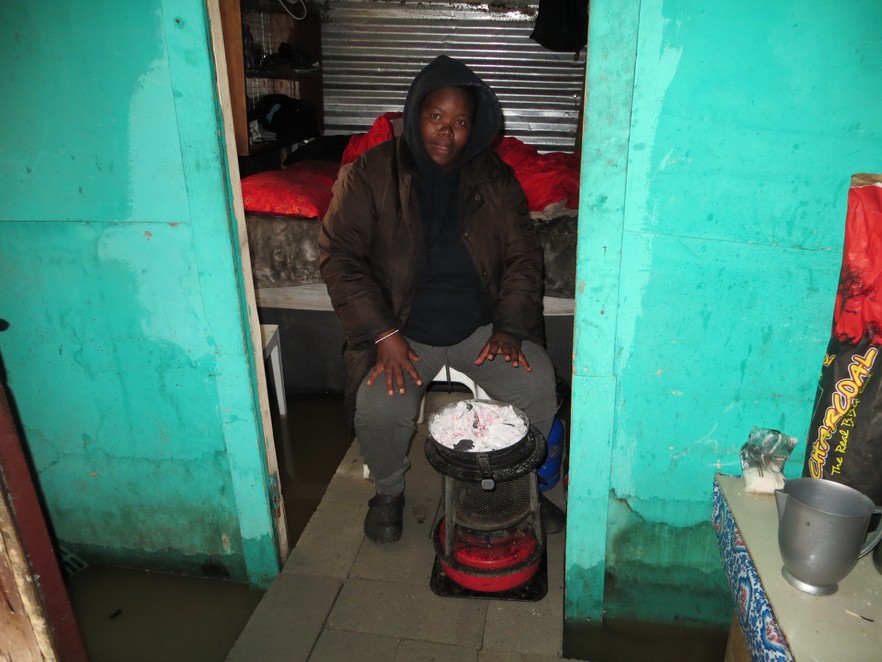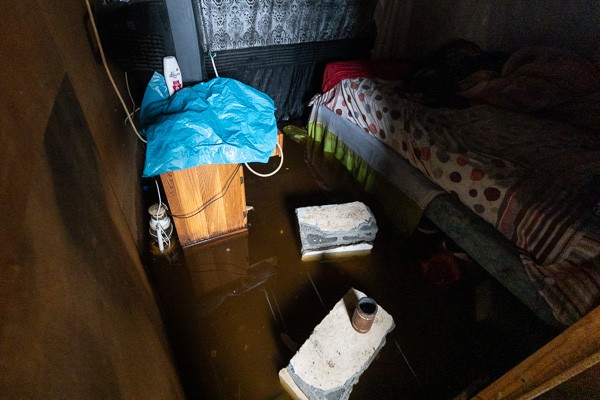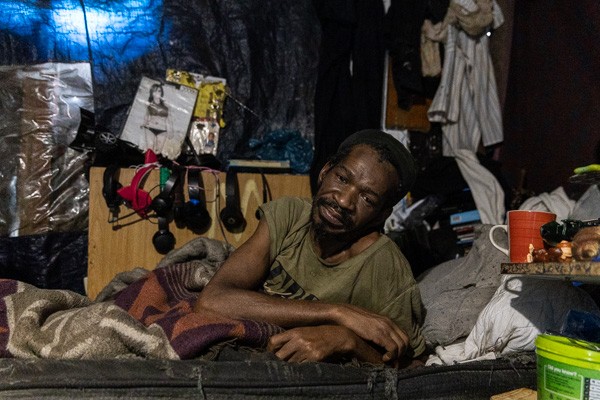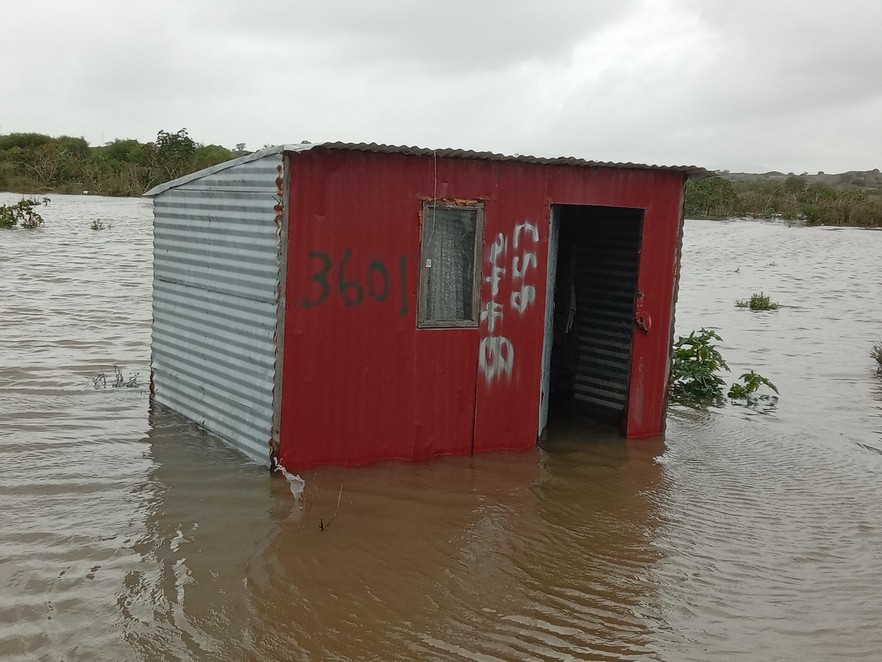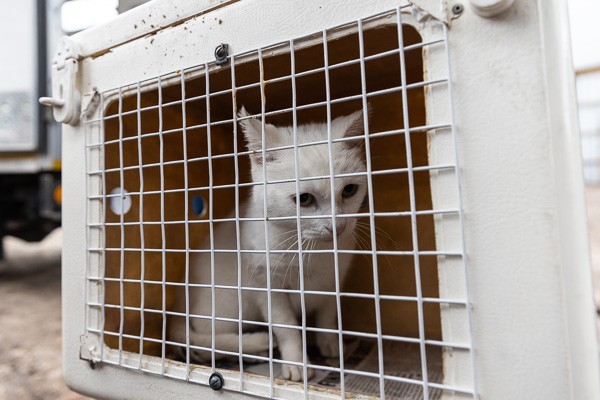Thembakazi Tshamlambo, who is mother to three children, bails water out of her two-room shack in Covid-19 informal settlement in Driftsand on Wednesday following heavy rains this week. Photo: Sandiso Phaliso
Schools in Cape Town, West Coast, and the Winelands will be closed tomorrow, with another fierce storm expected to hit the Western Cape.
Severe wind and rainfall since Sunday have resulted in road closures, towns being isolated, electricity disruptions, and flooding severely affecting about 15,000 people in Cape Town alone.
The school closures were announced by the Western Cape Education Department on Wednesday afternoon, as an intense cold front with a level 8 weather warning for rains was announced.
A South African Weather Service (SAWS) level 8 warning indicates the impact of the weather could be severe but there is a low likelihood of it occurring (Read a more detailed explanation on the SAWS website.)
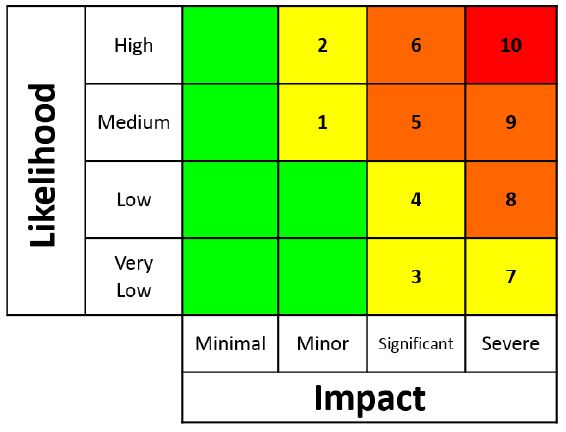
SAWS weather warning system. Thursday’s predicted storm has a level 8 warning.
Several roads in the Cape Winelands, Overberg, West Coast, Central Karoo and Garden Route regions remain closed. The latest list can be found here.
Metrorail services in Cape Town have also been affected. On the Southern line, there was no service between Kenilworth and Fish Hoek for most of Tuesday and Wednesday, due to signal failure at Wynberg station, and the Cape Flats line was suspended on Wednesday.
The Bellville service via Lavistown was also temporarily suspended on Wednesday, as was the shuttle service between Fish Hoek and Simon’s Town. However, no alternative bus services were provided by PRASA.
More heavy weather on the way
Meanwhile, more cold fronts, heavy rain and flooding are still expected to hit the central and western parts of the province for the rest of the week.
SAWS meteorologist Lehlohonolo Thobela said snowfall had been reported over the high lying areas of the Western Cape, as well as the escarpments of Eastern Cape through to the Drakensberg. There have also been reports of damaging winds across the west and south coast since Sunday.
The weather service issued a level 8 warning for disruptive rain and possible mudslides in Cape Town, Drakenstein and Stellenbosch on Thursday.
Cape Town Mayco Member for Safety and Security JP Smith on Wednesday stated: “Indications are that worse is still to come, before there is any respite.”
Homeless people seek shelter
The Haven CEO Shaddie Valayadum said at least 15 additional people had come to their shelters on Tuesday night, and there are about 120 beds still available across their 14 centres in Cape Town, Mossel Bay, and Paarl.
Valayadum said The Haven social workers were instructed to find people sheltering under bridges and eaves and encourage them to go to the shelters. He said they were targeting Kalk Bay, Fish Hoek, Muizenberg, Retreat, Wynberg, the city centre, Greenpoint, Woodstock, Kensington, Kraaifontein, and Bellville.
The shelters in District Six, Kalk Bay, Kensington, Greenpoint, and Wynberg were full.
He said they would make additional space available if needed.
Asanda Phakathi, who is nine-months pregnant and lives in Qanduqandu, Khayelitsha, says she buys coal at R45 a bag, which she burns to keep herself warm in her flooded home. Photo: Vincent Lali.
Flooded homes
On Tuesday, humanitarian agencies contacted by GroundUp said they were assisting flood victims in Khayelitsha, Lwandle and Nomzamo in Strand, Gugulethu, Philippi, Masiphumelele, Philippi East, Mfuleni, Tafelsig, and Vygieskraal.
Not mentioned was Eluxolweni informal settlement, situated on the Diep River floodplain near Dunoon, which is being flooded by rising water.
Shortly before sunset on Tuesday, Eluxolweni resident Nodule Masiko, who has 16-month-old twins and three older children, was trying to keep her children warm by making a fire with scrap cardboard, while the Diep River inched closer to her door.
A number of shacks further down the river bank were already knee-deep in water. One of them belonged to Ziyanda Mtshoniswa, who had fled to higher ground on Sunday with her partner Wandisile Lungana.
“We didn’t even take our clothes. We can’t wade through the flooded water to retrieve our belongings, it’s too deep. We don’t know what to do,” said Lungana.
Eluxolweni community leader Zukiswa Gidiminisana said most flood victims were staying with family in Dunoon and surrounding informal settlements. “We are helping those with no options,” said Gidiminisana.
In Marikana informal settlement, Philippi, Nokulunga Kolo said water was knee-high in her home when she woke up on Wednesday morning.
“Every day since Sunday I have been mopping up water using large buckets, but the water keeps coming back because the rain has not stopped,” said Kolo.
“The solution to avoid flooded shacks is to build proper houses for the people,” she said.
In Taiwan informal settlement, Khayelitsha, all exits and entrances were flooded, forcing residents to wade through water in order to get to work, school, or get to shops.
Luyanda Majova uses concrete blocks to step to his bed in KwaZulu Wetlands informal settlement in Masiphumelele. Photo: Ashraf Hendricks.
Luyanda Majova’s shack in the KwaZulu Wetlands informal settlement in Masiphumelele was ankle-deep in water, and he had placed concrete blocks on the floor as stepping stones to and from his bed. Majova said he had no relatives nearby and nowhere else to go. So he had no choice but to sleep in the cold, damp room.
He said as soon as he heard about the coming storms he sent his wife and children to the Eastern Cape to stay with relatives. His fridge and stove were damaged by the water and would need to be repaired.
At the Masidane informal settlement in Strandfontein, some residents among the approximately 400 households have dug large holes in the sand in an attempt to drain floodwaters. Masidane community leader Gouwa Swail said she has lived in the informal settlement for 20 years.
“It’s not nice. Every year we’re sitting with the same problem. every year we have to dig holes,” she said. “We are all wet. The storm is coming again, what are we going to do now?”
Johannes Afrika, who is paralysed from the waist down, said his clothes are wet and there is water on the floor of his home in Masidane informal settlement in Strandfontein. With more rain coming he says there is “no plan”, and he hasn’t received help from anyone outside the community. Photo: Ashraf Hendricks.
In a joint briefing on Wednesday, members of different provincial government departments gave an update on the multi-disciplinary response to the inclement weather.
Local government and environmental affairs MEC Anton Bredell said about 5,000 informal dwellings have been damaged, with about 15,000 people affected.
City of Cape Town Disaster Risk Management Centre spokesperson Sonica Lategan said when reports of flooding were received, officials from the Disaster Risk Management Centre and the Informal Settlements Management Branch were sent out to conduct assessments, facilitating requests for relief to be submitted to SASSA.
These assessments took time to complete, she said.
Mopping up
A break in the rain on Wednesday allowed people living in flooded informal settlements in Cape Town to mop up and prepare for further storms.
In Covid-19 informal settlement in Driftsands, Marikana informal settlement in Philippi East, and Taiwan informal settlement in Khayelitsha, people were struggling to get water out of their homes.
Furniture and electrical appliances were damaged, groceries ruined, and clothing and bedding soaked.
A flooded shack in Covid-19 informal settlement which has been abandoned. Photo: Sandiso Phaliso.
The Macassar river next to Covid-19 informal settlement had burst its banks, flooding people’s homes. Community leader Rogers Mfati said “thousands” of people had fled after the nights of pouring rain.
The City of Cape Town said it had been explained to Covid-19 residents that the land was unsuitable for human habitation and urged them to relocate. Much of the settlement is located within the former Driftsands Nature Reserve.
“The City tries to provide help where feasible, but some terrain and conditions like ponds and sandy dunes and ground-flooding make the provision of relief unfeasible,” said the City in an unattributed email.
Disaster management
Colin Deiner, Chief Director for Western Cape Disaster Management, said approximately 70 different agencies are working under disaster management. This ranges from rescue services, emergency medical services, and humanitarian aid, and our national and municipal disaster departments.
Deiner said rescue teams have been put on standby. This included the police, divers, the Department of Fire and Rescue Services, the National Sea Rescue Institute, and the South African Search and Rescue Services.
He said the Department of Social Development and SASSA are coordinating efforts with organisations across the province, and 11,000 meals have been provided to those affected.
Disaster management would continue to monitor the dam and river levels, particularly in Misverstand and Berg Rivers, and Laurens and Eerste Rivers.
“Eskom restored 6,000 clients’ electricity last night and currently 11,000 faults across the province are being prioritised for repair,” Denier said.
Pets affected
The Mdzananda Animal Clinic in Khayelitsha appealed to the public to help foster dogs, as the kennels were overcrowded and the roofs were leaking.
Communications executive Marcelle du Plessis said water was leaking into the operating theatre.
The clinic has also had to close its doors to the public because the kennels are at 150% capacity. Du Plessis said they were worried that people would not be able to keep their animals in the storm. “What happens to them?”
At the Tears Animal Rescue in Masiphumelele, a fallen tree damaged the roof of their main hospital and the runs accommodating stray dogs.
Tears operations manager Mandy Store said they made temporary repairs but the structures need to be fixed properly.
Store said they had been boarding many cats since the storm started on Sunday, and many dogs in Masiphumelele have been displaced, so it’s uncertain whether they’re abandoned or not.
“It’s not ideal to just pick up all the dogs running around. We don’t know whose pets they are.” She says that they are in desperate need of kennel space, and blankets and food for the community.
Operations manager at Tears in Masiphumelele, Mandy Store, said they’ve been boarding a lot of cats since the storms started in earnest on Sunday. Photo: Ashraf Hendricks.
GroundUp News
groundup.org.za

